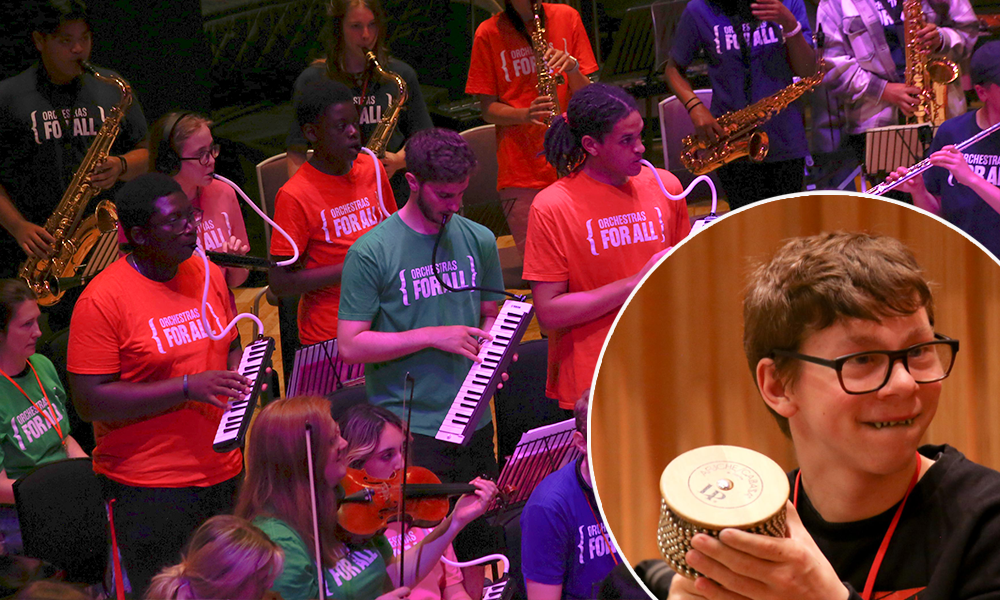It really is a game changer...
At Orchestras for All (OFA), we believe that every young person should have the opportunity to experience the joy of music-making with others, regardless of their background, ability or personal circumstances.
We know that inclusive music education can transform young lives and as part of this, creating a friendly and open environment for our ensembles is key to ensuring that all participants are given an equal chance to thrive.
Read on as we explore seven powerful benefits of inclusive music education and why it’s essential to create safe spaces where all young people feel seen, heard and valued.
1. It builds a culture of kindness
Inclusive music education is about so much more than just creating music – it's about making sure every individual feels valued and understood. When diverse groups of young people come together, each with their own unique story and perspective, they can learn to listen, support and respect one another. These skills are essential not just in music but also in life, encouraging young people to become more compassionate and engaged members of society.
At OFA, our commitment to inclusivity and wellbeing is seen at every level of our organisation – from how our core team and freelance staff collaborate, to how we engage and work with the young people who participate in our programmes, fostering an environment of kindness and understanding for all.
2. It breaks down social barriers
One of the most powerful benefits of inclusive music education is its ability to bring together young people from different social, cultural and economic backgrounds. In a supportive, inclusive ensemble, young people can form meaningful connections over their shared love of music without the social barriers they often face in other settings. Taking an inclusive approach enables young people to build lasting friendships and it instils a sense of belonging.
Both our National Orchestra for All (NOFA) and Modulo programmes bring together hundreds of young people from across the UK with diverse backgrounds who might not have met ordinarily. By the end of each rehearsal or live event, it’s clear for us to see how our accessible activities encourage new bonds and there’s always a buzz in the room!
Read more: Celebrating music and togetherness: Read our latest Impact report >
3. It improves health and wellbeing
Did you know that playing or listening to music can lower your blood pressure? According to Harvard Medical School, a nurse-led team at Massachusetts General Hospital found that patients who listened to music for 30 minutes had lower blood pressure, slower heart rates and showed fewer signs of distress than those who hadn’t listened to music.
Plus, it’s been scientifically proven that listening to music can promote a sense of calm and lower levels of cortisol, also known as your stress hormone. If you’re a young person and struggling with symptoms of anxiety, depression, trauma or grief, learning to make music with others in an inclusive setting can be a powerful tool to aid your recovery and help you cope in difficult times.
4. It celebrates diversity
Inclusive music education is all about embracing what makes each of us unique. Every young musician can bring something special to an ensemble, whether that's a different way of thinking and learning, or showing their peers a new way to express themselves. In an inclusive setting, there are no “right” or “wrongs”, empowering young musicians to speak up, share their point of view and take risks without the fear of being judged.
At OFA, our repertoire is chosen in collaboration with the young people we work with, so our programmes are jam-packed with pieces of music from multiple genres, reflecting the diversity of the young people who play them.
We also embrace different methods of learning, whether that’s by ear (rather than reading from traditional scores), Braille sheet music or colour-coded visual maps as an alternative form of notation. When everyone feels welcome and valued in an ensemble, it only serves to enrich group rehearsals and makes the music played even more meaningful.
5. It boosts confidence and self-esteem
As well as improving musical ability, inclusive approaches to music education can encourage personal growth, boosting young musicians’ confidence and self-esteem, while also developing their emotional intelligence and resilience.
As young people work together to overcome challenges, they can learn to manage their emotions, express themselves effectively and support others. These skills can be applied to all areas of life, whether that’s navigating social situations and relationships, coping with stress at work and school, or taking pride in personal achievements.
At NOFA residentials, members have the opportunity to take centre stage outside of full orchestra rehearsals and perform a piece of their choice in our famed recital evening, regardless of their skill level. This has become a true NOFA highlight, celebrating each young musician’s journey and providing them with a platform to grow.
Read more: Your voice matters: share your thoughts in Orchestras for All’s new brand survey >
6. It creates new opportunities for young people to shine
By providing tailored support to each individual through our expert team of orchestral and wellbeing tutors, inclusive music education at OFA enables young people to build upon their strengths and make meaningful contributions outside of the rehearsal room.
For example, our inspiring NOFA alum, Christian Dews, felt empowered to write his own composition after leaving the orchestra – and we’re very pleased to share that his brilliant work now features in this season’s NOFA repertoire.
At OFA, we’re committed to creating other opportunities for inclusive youth leadership too. This includes building teams of Ambassadors (paid roles for NOFA alums), creating roles in our core team, freelance team and Board of Trustees, and inviting young people to share their thoughts on our Youth Board. We want to give everyone a chance to shine and encourage our community to grow in a way that works best for them.
7. It improves teamwork
When it comes to music-making, collaboration is key. Every musician’s contribution is valued, whether they’re playing a stunning solo or supporting others in their instrumental section. Teamwork teaches young people how to listen, work together towards a common goal and be accepting of different ideas.
Last season, NOFA members enjoyed an inclusive workshop led by multi-instrumentalist and composer, Joe Broughton, in which they improvised to co-produce a powerful new piece of music, titled ‘Strength in Numbers’.
At OFA, we’ve witnessed firsthand the many benefits that come with inclusive music education, transforming young lives forever. Thank you to our generous funders, individual donors and supporters for continuing to champion our inclusive programmes. Let’s keep breaking down those musical barriers and set up young people for a brighter future.
Keen to support our inclusive work? Please donate what you can to our charity:



